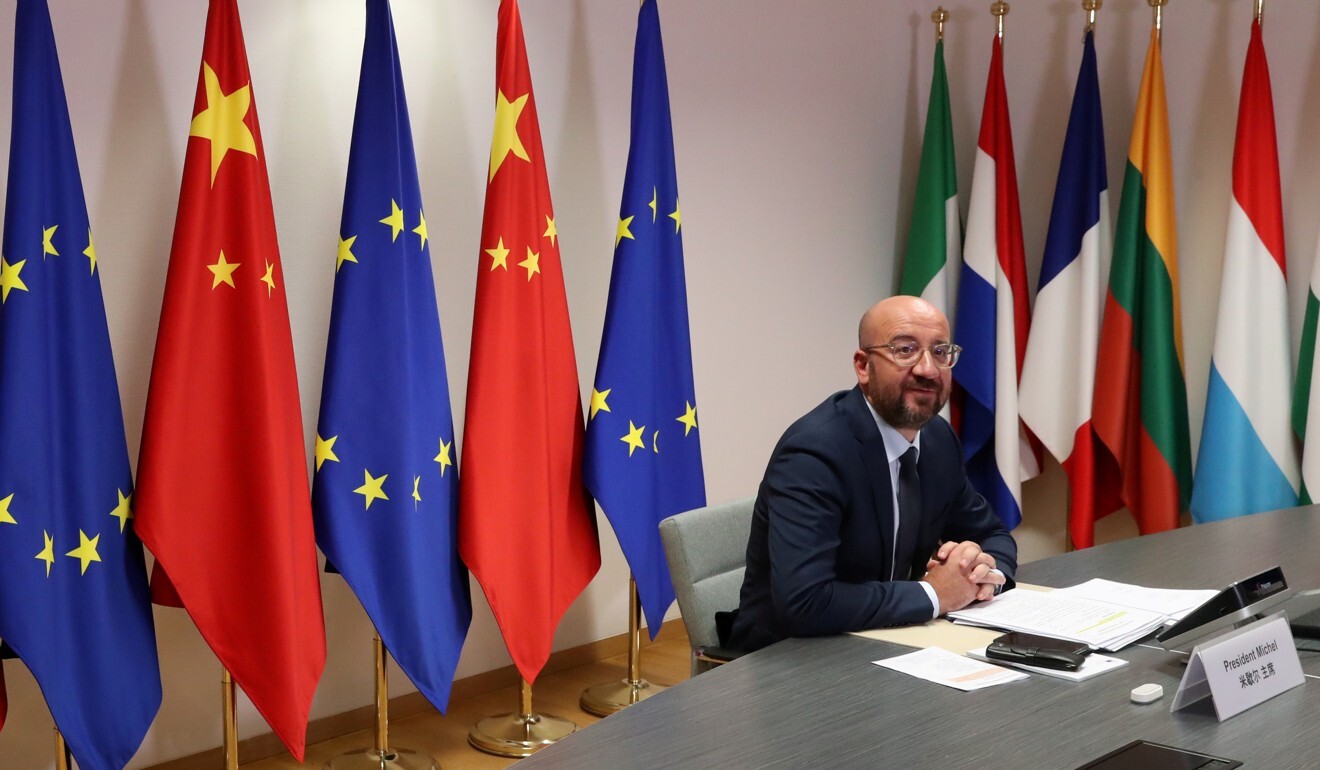
China-EU relations: can Xi Jinping win over European leaders at virtual summit?
- Chinese leader will have to make concessions if he is to prevent Brussels moving closer to Washington than Beijing, sources say
- South China Sea, Hong Kong and Covid-19 all likely to be on the agenda when Xi meets German chancellor and EU presidents on Monday
Not only will Xi face fresh calls from three EU leaders, including German Chancellor Angela Merkel, to make further economic concessions to close a seven-year-long negotiation on an investment treaty, he will also have to explain the worsening situation in Hong Kong, according to the EU’s agenda.
China is likely to present the summit as an example of cooperation and partnership, especially amid its deepening diplomatic stand-off with the US. But EU officials told the South China Morning Post they would not shy away from “standing firm” on issues where “we don’t see eye to eye with the Chinese government”.
New topics have arisen since the two sides last came together in June. On that occasion, Xi met European Council President Charles Michel and European Commission President Ursula von der Leyen, both of whom will be present on Monday.
Speaking on Saturday, Merkel said: “We are seeing that authoritarian systems can also be economically successful and challenge us on many levels. But they do this at the cost of basic rights. That is not our European way.”
The EU leaders are also expected to express concern over the introduction of the national security law in Hong Kong to crack down on political dissent, although there has been no indication the bloc plans to widen the scope of its punitive measures against the city’s government.
Liu He, Margrethe Vestager hold ‘constructive’ talks on global digital security
According to EU sources, the leaders will also make clear three specific climate change targets they say China should commit to: capping carbon dioxide emissions by 2025, as opposed to China’s target of 2030; achieving climate neutrality – reducing net greenhouse gas emissions to zero – by 2060; and stopping all new plans for coal-fired power stations, at home and abroad.
“We believe strongly that the EU needs to work with China where we can, and where we have to, but we also need to stand firm on our interest and our values,” a senior EU official said. “In other words, cooperation is possible – but firmness is necessary.”

Beijing has traditionally placed more emphasis on individual countries than the EU as a whole, but Xi’s meeting comes at a time of growing unity among EU member states on dealing with an assertive China.
“The emerging consensus between EU member states on China reflects a shared sense of economic imbalance, disappointment and unease,” said Janka Oertel, Asia director at the European Council on Foreign Relations.
The consensus “also stems from a growing range of political concerns”, she said.
China, Europe face a choice ‘that could shape the world’s future’
Chinese officials have long rejected the EU’s description of China as a systemic rival. In an article published by the Post on Saturday, Beijing’s ambassador to the EU Zhang Ming said it was “imperative to guard against any attempt to look at China-EU cooperation through the lens of geopolitics or ideology”.
That issue was also what drove Merkel to arrange a meeting between Xi and all 27 EU heads of government in Leipzig. The talks were later postponed indefinitely due to the coronavirus. Germany is by far the largest investor in China among all EU countries, and the agreement, once reached, will benefit the euro zone’s largest economy the most.
For the treaty talks, the major sticking points are on market access, and labour and environmental standards. EU officials expect von der Leyen – whose commission is the main driving force for the trade talks – will call on Xi to throw in personal political weight to let Chinese negotiators make further concessions.
“Reciprocity is the key word here,” a third EU source said. “If China wants to be an attractive destination for investments, it needs to reform and it needs to reform now.”
A leading European lobby group last week called on Beijing to depoliticise the business environment to de-escalate “wolf warrior diplomacy”, referring to the increasingly assertive style of Chinese diplomats who spread disinformation during the pandemic.
“I can imagine it’s painful for China, but we need their commitment,” chamber president Joerg Wuettke said.

